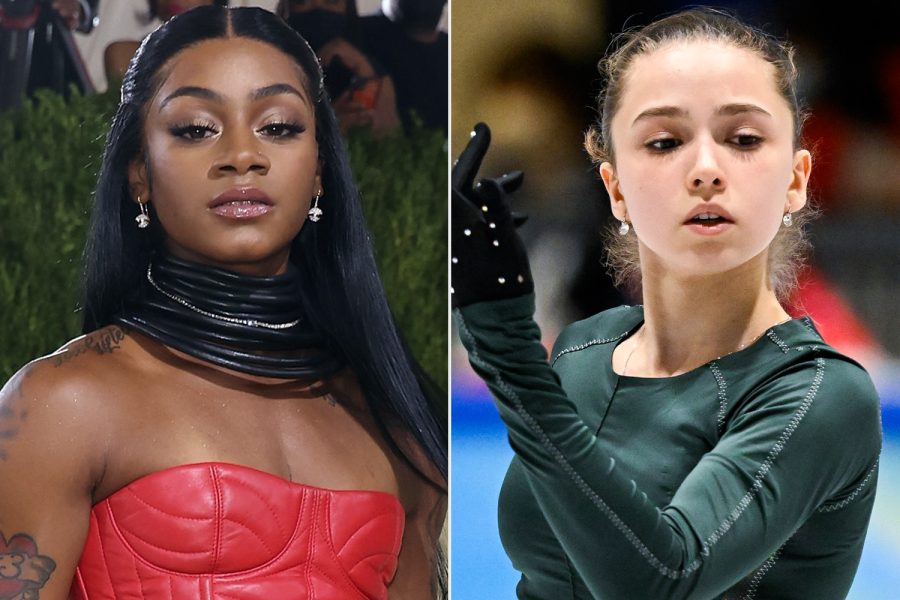Eyes Turn On Olympics Amid Racial, Drug Disputes
‘Sha’Carri Richardson (left) and Kamila Valieva (right) were the focus of both the 2021 and 2022 Olympics, due to their positive tests for drug usage’
March 2, 2022
On July 1, 2021, Sha’Carri Richardson was flagged for marijuana use, and prohibited from competing in the 2021 Summer Olympics. At just the age of 21, Richardson won the women’s 100-meter race at the U.S track and field trials in Oregon. But her positive drug test immediately disqualified her from further competition.
In the following days, there was vocal outrage from the public. Many questioned the authenticity of her Olympics disqualification, especially following the legalization of marijuana in 18 states, and the decriminalization in 13 states. Sha’Carri’s position as a successful young black women had many people wondering if this was yet another instance of systemic racism in sports.
Richardson herself condemned the motion, saying that it was to cope with the recent passing of her mother.
“However, being in that position in my life, finding out something like that, something that I would say, one of the biggest things that impacted me positively and negatively in my life,” Sha’Carri said.
“When it comes to the relationship I have with my mother, it definitely was a very heavy topic on me.”
Now, roughly 8 months later, another Olympics has come about with another athlete testing positive for drug use. 15 year old Russian Olympic figure skater Kamila Valieva tested positive for trimetazidine, a performance enhancing drug, on Feb. 8 (although she initially took the test in mid-December).
When the positive test came to light, Valieva had just competed in the first part of the individual competition. Because of her suspension, the medal ceremony was also delayed. Valieva then appealed the suspension, won and was allowed to temporarily continue competing.
Her lawyer stated that the drug’s use was inadvertent and was an unintentional ingestion via her grandfather’s medications.
The drug’s medical intention is to help individuals with heart conditions better receive oxygen to their lungs. However, this can be an advantage to athletes looking to better their air supply and therefore their athletic performance. The medicine is not to be ingested if under 18 years old.
After Valieva’s drug use came to light, Richardson tweeted her thoughts on Valieva’s appeal, saying, “Can we get a solid answer on the difference of her situation and mines? My mother died and I can’t run and was also favored to place top 3. The only difference I see is I’m a black young lady.”
The difference in how both of these scenarios were handled has sparked public controversy. Some people claim that this is a matter of race and that the only reason Valieva is not banned is because of the color of her skin.
The major difference seems to be the committee. Sha’Carri’s ban was handed out by the United States Anti-Doping officials and not the International Olympic Committee. Additionally, being only 15 years old means that there is a possibility that the doping was not her own choice.
This would not come as a surprise due to the fact that Russia has been in this situation many times before. Russia has the most athletes who have been caught doping at the Olympic Games, with more than 150. The athletes who were caught doping were stripped of their medals (46 total) and were banned from competing in future olympics. In 2019 the World Anti-Doping Agency barred Russia from international sport competition after concluding that the country had run a state-sponsored doping scheme at the 2014 Sochi Winter Olympics.
Could Richardson’s disqualification be in part due to racism? Yes. Because the Olympics has a rather long history of barring black women from competing, and marijuana has no physical advantage in the Olympics, unlike the drug Valieva tested positively for, it could be interpreted that way.
However, care should be taken when comparing the two cases.
Although Valieva has thus far faced no consequences, it’s too early to tell if her case is really an instance of favoritism or not. Until her case is reviewed further, she will still be allowed to compete. But there’s no question that right now all eyes are on Russia knj and the Olympics.









